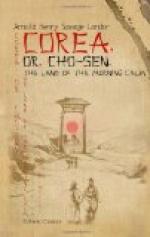It was then with some such feelings as these that I landed at Chemulpo. Hundreds of coolies running along the shore, with loads of grain on their backs, to be shipped by the Higo-Maru, had no compunction in knocking you down if you were in their way, and a crowd of curious native loafers, always ready to be entertained by any new arrival, followed you en masse wherever you went.
When I visited Chemulpo there were actually three European hotels there. These were European more in name than in fact, but there they were, and as the night was fast approaching, I had to make my choice, for I wanted a lodging badly.
One of these hotels was kept by a Chinaman, and was called Steward’s Hotel, for the simple reason that its owner had been a steward on board an American ship, and had since appropriated the word as a family name; the second, which rejoiced in the grand name of “Hotel de Coree,” was of Hungarian proprietorship, and a favourite resort for sailors of men-of-war when they called at that port, partly because a drinking saloon, well provided with intoxicants of all descriptions, was the chief feature of the establishment, and partly because glasses were handed over the counter by a very fascinating young lady, daughter of the proprietor, a most accomplished damsel, who could speak fluently every language under the sun—from Turkish and Arabic to Corean and Japanese. The third hotel—a noble mansion, to use modern phraseology—was quite a new structure, and was owned by a Japanese. The name which had been given by him to his house of rest was “The Dai butzu,” or, in English parlance, The Great God. Attracted by the holiness of the name, and perhaps even more by the clean look, outside only, of the place, I, as luck would have it, made the Dai butzu my headquarters. I know little about things celestial, but certainly can imagine nothing less celestial on the face of the earth than this house of the Great God at Chemulpo. The house had apparently been newly built, for the rooms were damp and icy cold, and when I proceeded to inspect the bed and remarked on the somewhat doubtful cleanliness of the sheets, “They are quite clean,” said the landlord; “only two gentlemen have slept in them before.” However, as we were so near the New Year, he condescended to change them to please me, and I accepted his offer most gracefully as a New-Year’s gift.
“O Lord,” said I with a deep sigh when the news arrived that no meat could be got that evening, and the only provisions in store were “one solitary tin, small size, of compressed milk.”
“Mionichi nandemo arimas, Konban domo dannasan, nandemo arimasen”: “To-morrow you can have anything, but to-night, please, sir, we have nothing.” As I am generally a philosopher on such occasions, I satisfied my present cravings with that tin of milk, which, needless to say, I emptied, putting off my dinner till the following night.




